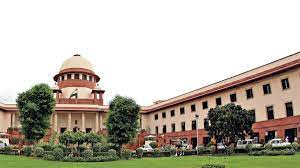The third respondent in her complaint stated that on 8th June 2017, she received a call from Sandeep. He abused her for not repaying the loan. The third respondent sought time of two months to repay the loan. On 15th June 2017, the first appellant came to the shop of the third respondent, where her husband was sitting. The first appellant demanded money, and the deceased husband of the third respondent pleaded with him to give him some time within which he could arrange for the money. It is alleged that the first appellant abused the deceased and assaulted the deceased with a belt. He also assaulted the third respondent and the mother of the deceased. It is alleged that the first appellant threatened the third respondent to abduct her daughter. (Para 3)
The third respondent alleges that Sandeep had taken 10 to 12 cheques from her. One cheque was dishonoured, so Sandeep issued a legal notice dated 27th June 2017 to the deceased. The third respondent alleges that her husband was under tension due to these events and, therefore, he was very upset. She alleges that due to the acts of the appellant of threatening him, the deceased took recourse to the extreme step of committing suicide. The prosecution is also relying upon the alleged suicide note written by the deceased on 30th June 2017. The deceased ended his life on 4th July 2017. By the impugned judgment, the High Court rejected the prayer of quashing the offence. (Para 4)
In the facts of the case, secondly and thirdly in Section 107, will have no application. Hence, the question is whether the appellants instigated the deceased to commit suicide. To attract the first clause, there must be instigation in some form on the part of the accused to cause the deceased to commit suicide. Hence, the accused must have mens rea to instigate the deceased to commit suicide. The act of instigation must be of such intensity that it is intended to push the deceased to such a position under which he or she has no choice but to commit suicide. Such instigation must be in close proximity to the act of committing suicide. (Para 9)
In the present case, taking the complaint of the third respondent and the contents of the suicide note as correct, it is impossible to conclude that the appellants instigated the deceased to commit suicide by demanding the payment of the amount borrowed by the third respondent from her husband by using abusive language and by assaulting him by a belt for that purpose. The said incident allegedly happened more than two weeks before the date of suicide. There is no allegation that any act was done by the appellants in the close proximity to the date of suicide. By no stretch of the imagination, the alleged acts of the appellants can amount to instigation to commit suicide. The deceased has blamed the third respondent for landing in trouble due to her bad habits. (Para 10)
Therefore, in our considered view, the offence punishable under Section 306 of IPC was not made out against the appellants. Therefore, the continuation of their prosecution will be nothing but an abuse of the process of law. (Para 11)
SUPREME COURT OF INDIA
2023 STPL(Web) 458 SC
[2023 INSC 1035]
Mohit Singhal & Anr. Vs. State Of Uttarakhand & Ors.
Criminal Appeal No. 3578 of 2023-Decided on 1-12-2023
https://stpllaw.in/wp-content/uploads/2023/12/2023-STPLWeb-458-SC.pdf







